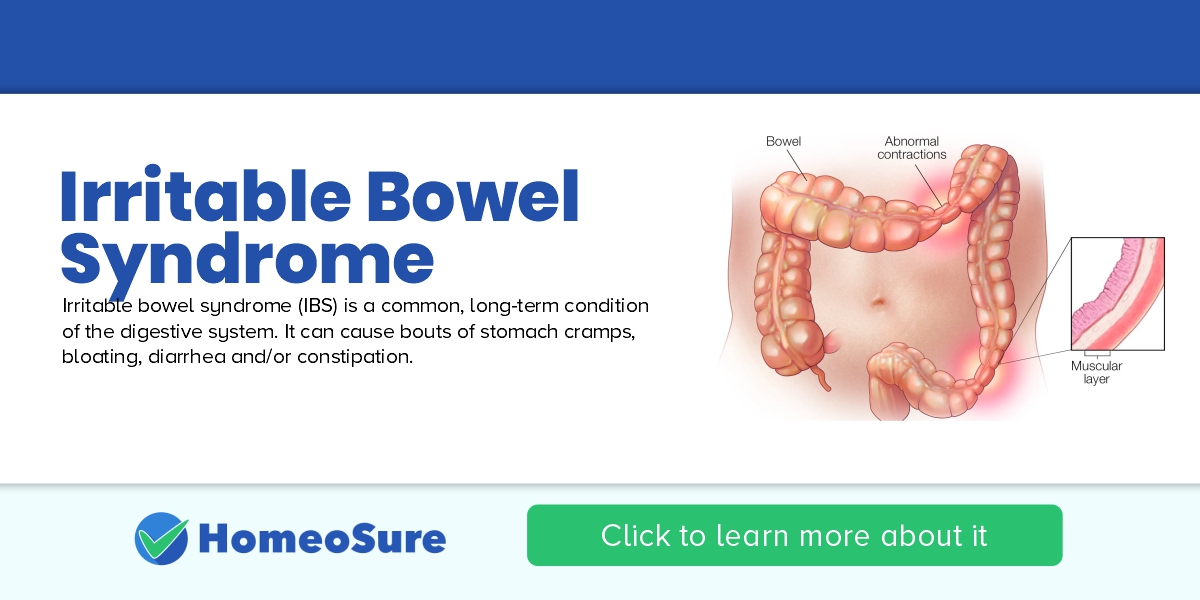Irritable Bowel Syndrome
Irritable bowel syndrome (IBS) is a common, long-term condition of the digestive system. It can cause bouts of stomach cramps, bloating, diarrhea and/or constipation.
The symptoms vary between individuals and affect some people more severely than others. They tend to come and go in periods lasting a few days to a few months at a time, often during times of stress or after eating certain foods.
You may find some of the symptoms of IBS ease after going to the toilet and opening your bowels.
IBS is thought to affect up to one in five people at some point in their life, and it usually first develops when a person is between 20 and 30 years of age. Around twice as many women are affected as men.
The condition is often lifelong without treatment, although it may improve over several years. IBS is a syndrome because it can cause several symptoms in addition to those mentioned, like cramping, bloating, gas, frequent urge to pass stools, sensation of incomplete evacuation etc.
IBS is the disorder of function, which means that the bowel doesn’t work, as it should. If one visualizes the bowel, it appears perfectly normal without any inflammation or other structural changes. In people with IBS, the intestines squeeze too hard or not hard enough and cause food to move too quickly or too slowly through the intestines.
Through the years, IBS has been called by many names–colitis, mucous colitis, spastic colon, spastic bowel, and functional bowel disease, irritable colon, and nervous colon.
CAUSES OF IBS
The exact cause of irritable bowel syndrome (IBS) is unknown, but most experts think that it’s related to problems with digestion and increased sensitivity of the gut
Many causes have been suggested – including inflammation, infections and certain diets – but none have been proven to directly lead to IBS. The cause of IBS is not known. Doctors also call it a functional disorder because there is no sign of disease such as inflammation or infection when the colon is examined.
With aggressive research done in this area over a period of time, scientists have come to the conclusion that the cause of IBS may be multifactorial, the cumulative effect of which results in the derangement of normal functioning of bowel. And the possible causes can be:
- Psychological factors like stress, anxiety, grief, disappointment, frustration, guilt etc.
- Sensitivity to food: Symptoms of IBS have also been known to be triggered by the ingestion of certain foods to which the individual is sensitive. Chocolate, milk products, caffeine, or large amounts of alcohol are frequent offenders. One theory states that lack of fibre in the diet can have detrimental effect. This lack of fibre causes irregular contractions of the large intestines.
- Genetics and heredity
- Post Infections
DIAGNOSIS OF IBS
- Thorough medical history: The doctor will take a complete medical history that includes a careful description of symptoms. The symptoms that favour diagnosis of IBS are:
- Relief of abdominal pain with defecation
- Looser stools with the onset of pain
- More frequent bowel movements at onset of pain
- Abdominal bloating or distention
- Feelings of incomplete evacuation
- Passage of mucus per rectum
-
- Physical examination
- Laboratory test
There are no specific lab tests that can diagnose IBS. Your doctor will see if your symptoms match with the definition of IBS, and he may run tests to rule out conditions such as:
- Food allergies or intolerances, such as lactose intolerance and poor dietary habits
- Medications such as high blood pressure drugs, iron, and certain antacids
- Infection
- Enzyme deficiencies where the pancreas isn’t releasing enough enzymes to properly digest or break down food
- Inflammatory bowel diseases like ulcerative colitis or Crohn’s disease
- Your doctor may do some of the following tests to decide if you have IBS
- Flexible sigmoidoscopy or colonoscopy to look for signs of blockage or inflammation in your intestines
- Upper endoscopy if you have heartburn or indigestion
- X-rays
- Blood tests to look for anaemia (too few red blood cells), thyroid problems, and signs of infection
- Stool tests for blood or infections
- Tests for lactose intolerance, gluten allergy, or celiac disease
CONVENTIONAL TREATMENT
Conventional medicines for IBS are directed to relieve the symptoms associated with IBS. However, they fail to rectify deranged brain-gut communication and hence can merely provide symptomatic relief. However, they cannot cure the condition. Moreover, majority of them have inherent side effects and they may not be beneficial to each and every individual.
DIET IN IBS
- Healthy eating and lifestyle changes
- Plenty of fruit and vegetables
- Plenty of starchy carbohydrates
- Some milk and dairy products (2-3 portions per day). If you are lactose intolerant include dairy alternatives such as soya, rice or oat milk and yogurts that are enriched with calcium
- Limited amounts of foods high in fats and sugars. Limit saturated fat that is found in animal products such as butter, ghee, cheese, meat, cakes, biscuits and pastries
- Drink plenty of fluid – at least two litres
- Have a regular meal pattern
- Take time when eating meals
- Try not to skip meals
- Sit down to eat, and chew food well
- Do not eat late at night
- Exercise regularly, such as walking, cycling, or swimming. If finding time is difficult, incorporate it into your day
- De-stress
- Reduce Caffeine
- Limit Alcohol
- Decrease intake of resistant starches
HOMEOPATHIC TREATMENT
Homeopathic treatment is targeted towards UPROOTING THE DISEASE and ensuring health with no side effects. For prescribing to an individual, a PLAN OF TREATMENT is followed which involves:
- GETTING THOROUGH UNDERSTANDING OF CASE which includes complete case taking (analyzing patient as an individual) along with patient history and family history
- DIAGNOSIS OF PATIENT AND DISEASE
- INDIVIDUAL ASSESSMENT OF THE CASE
- PRESCRIBING THE MOST SUITABLE INDIVIDUAL CONSTITUTIONAL REMEDY
